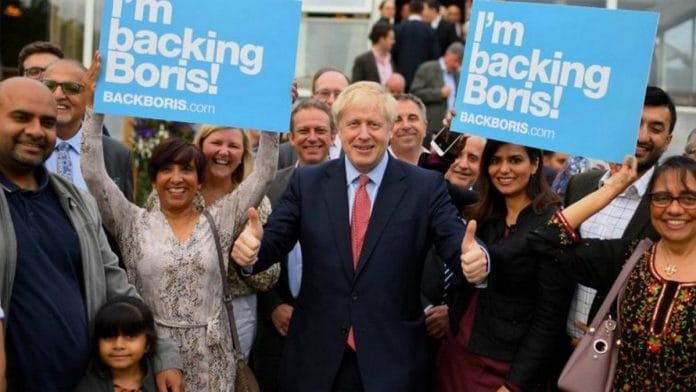New Delhi: As the UK is set to go to polls on 12 December, a lesser-known fact is that Indian citizens living in Britain can also vote. The UK is home to a 1.5-million strong Indian diaspora, which can, therefore, help determine the electoral outcome.
In an attempt to woo the Indian community, British Prime Minister Boris Johnson had last week visited a famous Hindu temple in London and even vowed to partner with Prime Minister Narendra Modi to “build a new India”.
The fact is citizens of all Commonwealth countries — India being one of them — and Ireland living in the UK enjoy complete voting rights in Britain. They can vote in local, supralocal, devolved parliaments and general elections.
Citizens of the European Union, however, can vote only in the first three elections.
This raises the question that in the midst of rising nationalistic sentiments, why does the UK give so many people voting rights in its elections? The answer lies in the conceptualisation of “British subjects”.
Also read: Britain’s Labour MPs question India on Kashmir to please their Pakistani-origin voters
All ‘British subjects’ can vote
According to the UK’s electoral laws, citizens of nearly 50 Commonwealth countries, British Dependent Territories and Ireland can vote in all the country’s elections, provided they all stay in Britain.
“The Representation of the People Act, 1918, provided that only British subjects could register as electors,” noted Migration Watch UK.
“However, the term ‘British subject’ included any person who, at that time, owed allegiance to the Crown, regardless of the crown territory in which they were born. This included Commonwealth citizens and has never been revised,” it added.
It is because of how the British empire conceptualised itself and what it meant to be a British subject — the citizens of Commonwealth countries still enjoy voting rights in the UK.
UK citizens can vote in Commonwealth countries too
After the end of World War 2, Britain lost most of its territories and it was no longer the “empire that ruled the world”. But the vast majority of Britain’s political class continued to believe that it was still the great British empire and thus, extending voting rights to all “British subjects” was only the natural thing to do.
Thus, even after the British empire has long gone, the concept of a “British subject” still stays even today and so do their voting rights in the UK. The actual laws have, however, changed after 1983 and the term “British subject” is no longer used.
The voting rights given to citizens of the Commonwealth countries living in the UK are reciprocated by a few of those countries.
UK’s citizens enjoy similar voting rights in “Antigua & Barbuda, Dominica, Grenada, Guyana, Jamaica, Mauritius, St Lucia, and St Vincent & The Grenadines”.
But major countries such as India, Australia and Canada do not extend similar rights to British citizens.
More than just voting rights
In addition to voting rights, Commonwealth citizens also enjoy a range of other rights and privileges.
For instance, they have access to British consular services in non-Commonwealth countries in case their home country has not established an embassy or a diplomatic post. They can also apply for an emergency British passport if they lose their passport or it is stolen in a non-Commonwealth country.
More substantively, Commonwealth citizens can join non-reserved civil service posts in the UK and even join British Armed Forces.
Irish voting rights
The citizens of both the UK and Ireland enjoy voting rights in each other’s countries. This essentially comes from historical contexts.
Initially, as a part of Great Britain, the Irish had voting rights in the country. And even after they attained independence, they continued to enjoy the voting rights.
UK’s citizens were given voting rights in Ireland as part of an effort to maintain peace in Northern Ireland. In 1984, the Ninth Amendment of the Irish constitution, which came into force in the same year, gave voting rights to British citizens living in Ireland.
(Edited by Debalina Dey)
Also read: Outcry in poll-bound UK as pro-BJP groups campaign for Conservative Party






